US, Israel Discussing Plan B In Case Iran Deal Falls Apart
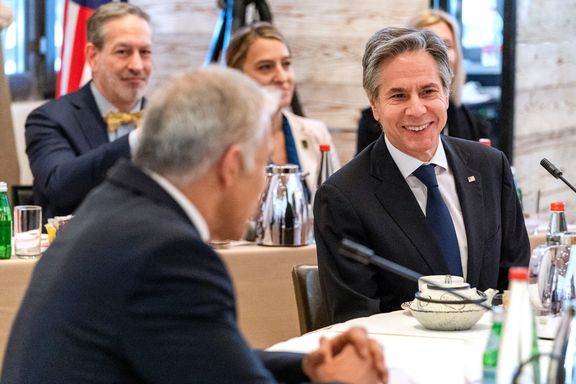
The Biden administration has recently started discussing with Israel a “Plan B” scenario in case the 2015 nuclear with Iran deal known as JCPOA is not revived.

The Biden administration has recently started discussing with Israel a “Plan B” scenario in case the 2015 nuclear with Iran deal known as JCPOA is not revived.
According to Axios, Israel is pressing the Biden administration to cooperate on a “Plan B” in case long-running negotiations with Iran fail.
US and Israeli officials said that Israel’s national security adviser Eyal Hulata is scheduled to arrive in Washington later this week for meetings of the strategic working group on Iran with his American counterpart, Jake Sullivan.
Headed by the national security advisers on both sides, the working group — code-named “Opal” ("Leshem" in Hebrew) — was established in the early days of the Obama administration to strategize over how to apply pressure on Iran.
In phone a call on Sunday, President Joe Biden and Israeli Prime Minister Naftali Bennett discussed the threat posed by Iran and its proxies, and the possibility of removing Iran’s Revolutionary Guard, aka IRGC, from the list of Foreign Terrorist Organizations (FTO) that Tehran has demanded.
Bennett said in a statement after the call, “I am sure that President Biden… will not allow the IRGC to be removed from the list… Israel has clarified its position on the issue: The IRGC is the largest terrorist organization in the world."
Pundits now consider a deal to restoration of the JCPOA much less likely than in mid-March when it appeared to be only a few days away, as Tehran and Washington both insist on their positions.
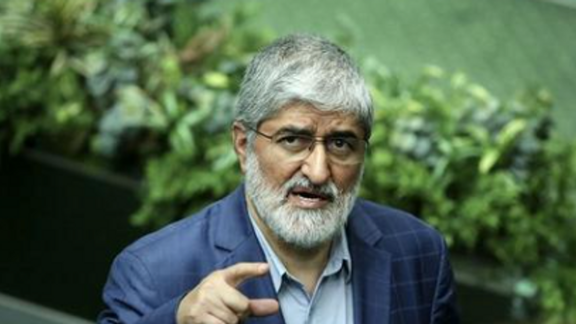
Former senior lawmaker Ali Motahari says his Sunday remarks about Iran's intention to build nukes when it started its nuclear program were misinterpreted.
"It was said [in the interview] that there were several people in the beginning who believed that there was no problem with building [a nuclear] weapon to inspire awe in the enemy… but that using it was not permissible. This let the hypocrites to report the Islamic Republic's nuclear activities as [an attempt] to build bombs," a statement published Monday on Motahari's official website claimed.
Iranian officials always refer to the exiled Mujahedin-e Khalq Organization (MEK) as 'hypocrites'.
The Islamic Republic has never pursued the policy or aimed at building a nuclear bomb as per Supreme Leader's view its production is religiously forbidden (haram), the statement further said.
In response to a question in an interview published Sunday about his assertion in the past that using a nuclear bomb was religiously banned (haram) -- but building one, as a deterrent, was not – Motahari said that Iran’s nuclear program had aimed to develop nuclear weapons as a deterrent in its initial stages, but that the program was not properly kept secret, which led to its disclosure by the MEK.
All of Motahari's controversial remarks on the nuclear issue have now been removed from the text of the interview with Iran Student Correspondents Association (ISCA News). The text now only shows the sentence "The Supreme Leader believes that building nuclear weapons is completely impermissible."

The original text, however, left very little room for claiming "misrepresentation" of Motahari's remarks. Motahari had said that an Iranian bomb could have ensured "great deterrence" if it had been kept secret and tested as it was done by Pakistan. "Other countries take consideration of nuclear power so I believe that we should have followed through with what we had started," the original text had also quoted him as saying.
As proof of his claim, Motahari had argued that a country only aiming to have peaceful nuclear technology would begin with launching nuclear reactors, not an enrichment program. "Carrying out enrichment directly gives rise to suspicions that we aim at building a bomb," the original interview text said while stressing that Khamenei now believes that building a bomb is "totally haram".
Western governments and their allies allege that Iran's nuclear program aims at building nuclear weapons, but the Islamic Republic has always insisted that the program is solely for peaceful purposes including power generation.
Motahari's remarks caused quite a stir in the media, and he has been accused of making false claims. A website with links to Iran's Supreme National Security Council, Nour News, refuted Motahari's remarks within hours from the publication of the interview.
"The Islamic Republic of Iran's peaceful nuclear program has never had a military dimension and statements by unauthorized individuals in this regard are a result of their unfamiliarity with the matter or their particular political views," Nour News quoted an "informed source" as saying while the MEK on Sunday cited Motahari's remarks as proof of its revelation in August 2002 that Iran was running secret facilities for enrichment in Natanz and for production of heavy water in Arak.
This is not the first time Iranian officials mention earlier plans for building nuclear weapons. In his memoires, Iran's former president, Akbar Hashemi-Rafsanjani has said that Iran was considering building a nuclear bomb during the war with Iraq (1980-1988) but never followed it through. In a secret letter to then Supreme Leader, Ayatollah Ruhollah Khomeini in 1988 which later became public, Mohsen Rezaei, former commander of the Revolutionary Guards (IRGC), had said that Iran had to have "laser and nuclear weapons" to be able to deter Iraqi aggression.
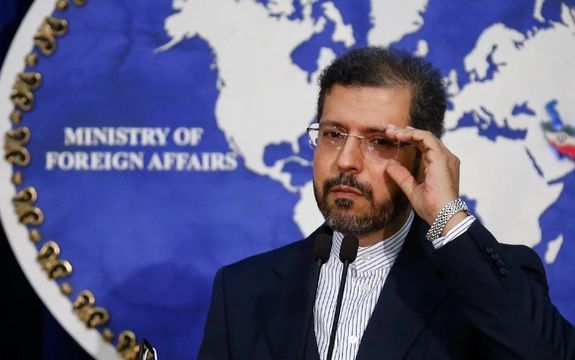
Iran’s Foreign Ministry Spokesman said Monday that Tehran and the European Union had agreed that stalled nuclear talks should resume "as soon as possible.”
"So far no decision has been made as to where and what level the meeting should be held but it's on agenda," Saeed Khatibzadeh told reporters at his weekly press briefing.
Referring to Foreign Minister Hossein Amir-Abdollahian's Friday phone talk with EU foreign policy Chief, Josep Borrell, Khatibzadeh said the two sides had agreed that a pause since mid-March in Vienna talks to restore Iran’s 2015 nuclear agreement with world powers was not “helpful.”
"We would have been in Vienna, obviously, if the US had made a clear response,” Khatibzadeh said, reiterating Iran’s view that Washington was blocking agreement in the talks, that have struggled to agree which US sanctions violate the 2015 agreement, and exactly how the Iranian nuclear program should be returned to the limits of the agreement, the JCPOA (Joint Comprehensive Plan of Action).
Borrell had expressed frustration over the pause in the talks and called for fresh contacts between Enrique Mora, the senior EU official chairing the Vienna process, and Iran’s lead negotiator Ali Bagheri-Kani.
Khatibzadeh said that Bagheri-Kani and Mora were regularly in touch, and that Iran had agreed most issues with other parties to the JCPOA – China, France, Germany, Russia, and the United Kingdom. Mora, he said, was left with issues outstanding between Tehran and Washington. Having left the JCPOA in 2018, the US takes part in the Vienna process indirectly.
The Iranian foreign ministry spokesman said the US and Israel had in public reduced these outstanding matters to disagreement as to whether the US current listing of Iran’s Revolutionary Guards as a ‘foreign terrorist organization’ was compatible with the JCPOA. Former US president Donald Trump designated the Guards in 2019 after introducing ‘maximum pressure’ sanctions.
"Issues between us can neither be reduced [to the delisting] nor be simplified," Khatibzadeh said. He reiterated that all sanctions imposed by Trump needed to go for Iran to gain the economic benefits laid out in the JCPOA.
Prisoners, and elections
The spokesman also dealt with a potential prisoner swap with the US, responding to US Secretary of State Antony Blinken's Saturday tweet aboutAmericans jailed in Iran that any exchange was an exclusively humanitarian matter. There has been repeated speculation in recent month and weeks over the release Iranian assets frozen abroad, some linking it to a prisoner release and some to the Vienna talks.
Referring to suggestions that President Joe Biden is delaying agreement on JCPOA restoration until after November’s US Congressional elections, Khatibzadeh said, US domestic politics should not determine the outcome of Vienna talks.
In response to a question over Iran's recent announcement of a new factory at Natanz to make nuclear parts, Khatibzadeh the International Atomic Energy Agency (IAEA) had full knowledge of the move, which resulted from sabotage at the Karaj site widely attributed to Israel.
" Iran is a member of the Non-Proliferation treaty (NPT),” he said. “We have followed NPT word by word. We transferred our centrifuges according to NPT…We are entitled under the Non-Proliferation Treaty to carry out any actions required to meet our needs.”

A former senior Iranian lawmaker has disclosed that Iran’s aim from the beginning was to produce nuclear weapons, but it failed to keep the project secret.
Speaking with Iscanews in Tehran on Sunday, Ali Motahari said that Iran’s nuclear weapons project was meant to be develop a deterrent force, but the Mojahedin Khalq (MEK) opposition group revealed the program to the world (2002).
(Hyperlink to Iscanews removed by Iran International, because original report was edited the following day, deleting most of Motahar's remarks.)
Motahari, a former deputy speaker of parliament added, “A country that wants to have a peaceful nuclear program does not start with [uranium] enrichment,” which creates the perception that the goal is making nuclear bombs.
“If we could secretly produce and test a [nuclear] bomb like Pakistan [did], it would be a great deterrent,” he said, and went on to argue that “I believe if we started something, we should have finished it.”
Motahari immediately added that “now the view of the Supreme Leader is that producing nuclear weapons is haram,” or religiously forbidden.
Motahari, who is a social and religious conservative, has been an outspoken critic of certain policies of the Islamic Republic in recent years, including restricting fair competition within the system and political freedoms.
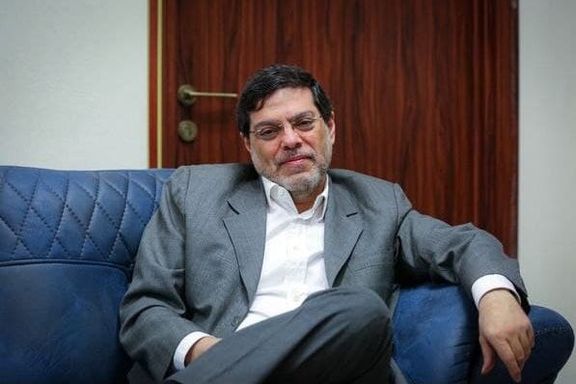
A member of the Iranian delegation to the nuclear talks says the Ukraine war will eventually force Washington to agree to Tehran's demands and make a deal.
"Failure to reach a deal [so far] is a result of domestic troubles in the US but the ever-increasing problems caused by the Ukraine war will put pressure on [President Joe] Biden to accept the necessity of a deal [with Tehran]," Mohammad Marandi, the US-born media advisor of the Iranian delegation to the Vienna nuclear talks told the official news agency IRNA on Sunday.
Marandi claimed that none of the other parties in the talks -- the three European sides, Russia, China and Tehran -- have any problem with continuing the talks. "It has to be seen what decision Biden will make about continuing [the negotiations]," he said.
Marandi who is often interviewed as a commentator on Iran's foreign relations by the state media told IRNA that Americans admit Iran has scored 'considerable gains' in the talks. "That's why some of the members of the US delegation resigned and left the teas in protest," he said referring to the resignation of Richard Nephew, the architect of Washington's sanctions on Iran in January, and part-time senior adviser Dan Shapiro in March.
"Talks were progressing fast during the last few days but the Americans abruptly put a break to them over various issues including the lifting of sanctions and its verification, guarantees, as well as [delisting of the] IRGC," Marandi said.
Tehran insists that the designation of the IRGC as a terrorist organization was part of the Trump administration's 'maximum pressure' campaign against Iran and therefore should be reversed, but the US considers the designation unrelated to the nuclear issue.
Iranian officials reiterate that it is Washington's "excessive demands" that has prevented a deal from materializing and that Tehran will not surrender to such demands.
What the US state department has said is that if Iran wishes to discuss sanction unrelated to the nuclear issue, it should accept to widen the talks to include other outstanding problems.
Pundits now consider a deal to restore the 2015 deal, Joint Comprehensive Plan of Action (JCPOA), much less likely than in mid-March when it appeared to be only a few days away, as Tehran and Washington both insist on their positions and throwing the onus on each other.
"Chances of a deal and the restoration of the JCPOA are less than a few months ago. For any progress either the US or the Iranian side must make a compromise. It's quite possible that failing to do so could prevent a deal from being made," Karl Kaltenhaler, director of the Center for Intelligence and Security Studies at The University of Akron in Ohio told the Iranian Labour News Agency (ILNA) Thursday.
In an interview with London-based The New Arab newspaper published Friday, the US ambassador to the UN Linda Thomas-Greenfield said there was a possibility that there will not be an agreement over the restoration of the JCPOA and mutual compliance. "We're ready and they're not," she said.
She also reiterated that the Biden administration would work to ensure that Iran is never allowed to acquire nuclear weapons, suggesting that the US will use its vote, if the matter is referred to the UN Security Council, to put the brakes on Iran's nuclear program.
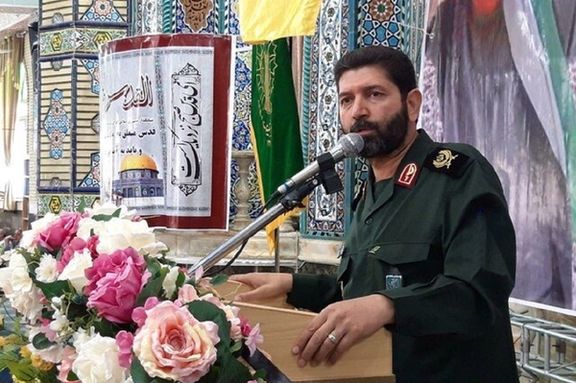
A Revolutionary Guard commander fears that some in Iran might surrender to the idea of limiting IRGC's power in a bid to make a nuclear deal with Washington.
Speaking before the Friday prayers in Tehran on April 22, Gen. Hassan Hassanzadeh called those elements "lowly people and those who have sold their soul to the enemy."
Hassanzadeh is a key figure although he is not often mentioned in the media. He is the commander of IRGC forces in the capital Tehran, a fearsome unit that has been often used to suppress popular protests and is tasked with defending the Islamic Republic's centers of power.
Nuclear talks with Iran have come to a standstill since March after Tehran demanded that Washington remove the IRGC from its Foreign Terrorist Organization list.
The Biden administration has said that if Iran wants sanctions relief beyond those imposed for its nuclear activities it should be ready to negotiate over regional issues, effectively meaning limiting its interventions in other countries.
Iran's Foreign Minister had said in March that IRGC commanders are prepared to sacrifice their interest for the greater interests of the Islamic Republic and forego the call for delisting the IRGC to facilitate an agreement between Tehran and Washington.
Hassanzadeh said: "I wish to tell all the enemies and mean elements who have sold their soul to the enemies that the IRGC will never and by no means be limited."
The Commander of the IRGC's naval force Alireza Tangsiri on Thursday announced that Iran will not give up its intention of seeking revenge for the killing of former Qods Force Commander Qasem Soleimani, insisting that the IRGC would never forget the idea of seeking revenge.

The commander of IRGC's ground forces Mohamad Pakpour also claimed that "even the killing of all of US leaders will not be enough as a revenge for the murder of Soleimani."
These comments by IRGC commanders come at a time when many in Iran, including politicians are disappointed with the dim prospects of an agreement that could lift economic sanctions.
Former Iranian diplomat Ghassem Mohebali told Nameh News website that the Iranian government is still not inclined to offer explanations about the contents of any draft agreement with the US side.
"This is partly because of the weakness of Iran's negotiating team and its members' lack of familiarity with the way diplomacy works," he said, adding that "putting forward matters that were not part of the 2015 deal (JCPOA) could also be another hindrance." These matters include the role of the IRGC in the region as well as Iran's ballistic missile program.
He warned that the deadlock could lead to taking Iran’s nuclear breaches to the UN Security Council, where the other side has the right to veto any decision.
Meanwhile, Hossein Shariatmadari, the editor of hardline daily Kayhan, who is close to Supreme Leader Ali Khamenei's office said in an interview with Iran's state-owned radio that "the negotiations are not likely to lead anywhere” because the US is creating other issues outside of the nuclear question.
Shariatmadari added that some countries including South Korea are undermining Iran's right and refusing to pay their debts to Tehran fearing that they might be affected by US secondary sanctions. He added that the Americans have linked some of their sanctions to the JCPOA while they have withdrawn from the agreement and are no longer part of the JCPOA.
Shariatmadari further added that the JCPOA was a golden document for the US side while it did not have any benefit for Iran.
Iranian analyst Mehdi Ayati also told Nameh News that he is not optimistic about a possible agreement with Washington, because he believes that the JCPOA ended when former US President Donald Trump pulled out of the agreement in May 2018.